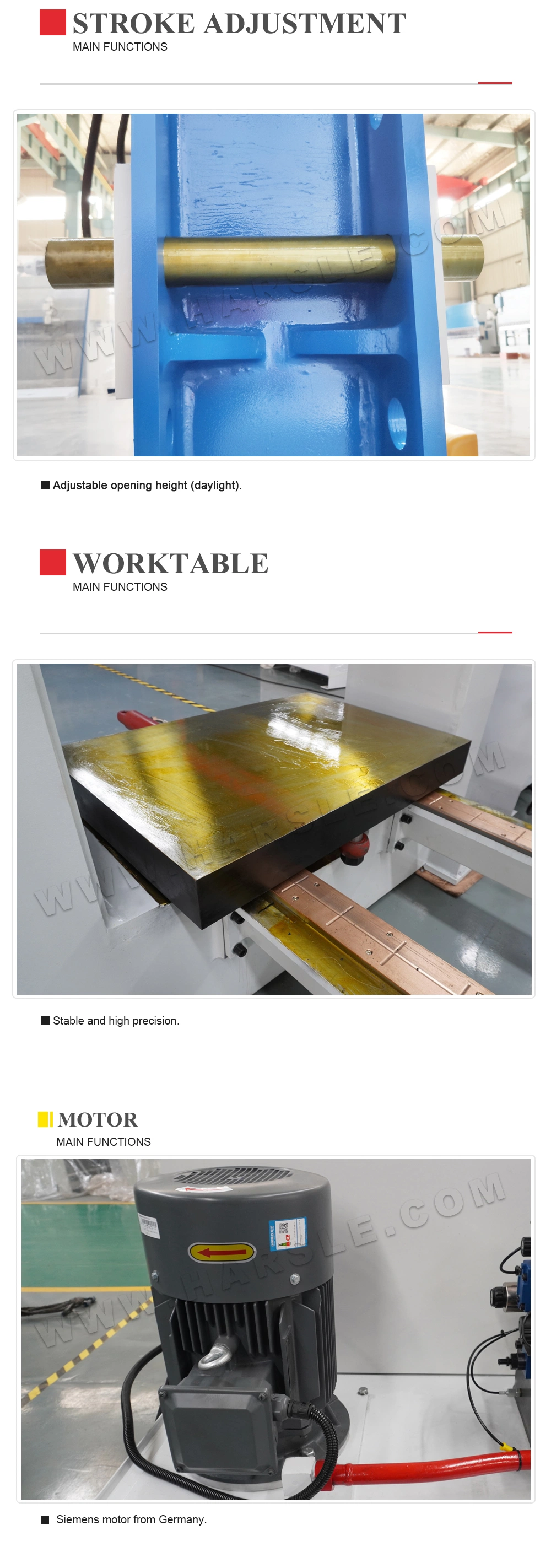Basic Info.
Model NO.
YL
Certification
CE
Transport Package
Standard Package
Specification
160T
Trademark
HARSLE
Origin
China
HS Code
8462399000
Production Capacity
100 Sets/Month
Packaging & Delivery
Package Size
50.00cm * 40.00cm * 30.00cm
Package Gross Weight
500.000kg
Product Description
China High-Quality YL Series Gantry Hydraulic Machine H Frame Hydraulic Press
A shop press, also known as a hydraulic press or workshop press, is a machine tool that uses hydraulic pressure to compress or deform various materials. It consists of a sturdy frame, a hydraulic cylinder, a ram or piston, and a pump. Shop presses are commonly used in workshops and manufacturing facilities for tasks such as bending, straightening, pressing, and molding metal or other materials. Here are some key features and uses of a typical shop press:
Key Features:
Frame: The frame is typically made of heavy-duty steel to provide stability and support during pressing operations.
Hydraulic Cylinder: The hydraulic cylinder is responsible for generating the force needed for pressing. It is connected to a hydraulic pump that supplies hydraulic fluid to create pressure.
Ram/Piston: The ram or piston is the component that actually applies force to the material being worked on. It's attached to the hydraulic cylinder and moves vertically.
Hydraulic Pump: The pump is used to supply hydraulic fluid to the hydraulic cylinder, creating pressure and facilitating the movement of the ram.
Pressure Gauge: Many shop presses come with a pressure gauge that allows operators to monitor and control the amount of force applied during the pressing operation.
Adjustability: Some shop presses have adjustable features such as bed height, ram travel, and pressure settings, providing versatility for different tasks.
Common Uses:
Metal Forming: Shop presses are widely used for forming and shaping metal components. This includes bending, straightening, and pressing metal sheets or plates.
Assembly: They are used for assembling and disassembling parts by applying controlled pressure. This is common in tasks like pressing bearings, bushings, or gears into place.
Molding and Die-Cutting: Shop presses are employed in molding and die-cutting processes, particularly in industries such as rubber manufacturing.
Brake and Suspension Work: In automotive workshops, shop presses are often used for tasks related to brakes and suspension, such as pressing out or installing bushings.
Powder Compaction: In industries like pharmaceuticals or ceramics, shop presses can be used for compacting powders into solid forms.
Custom Fabrication: Many metalworking shops use shop presses for custom fabrication work, allowing them to create specific shapes or configurations.
Before using a shop press, it's important to follow safety guidelines and ensure that operators are trained on proper usage. Additionally, understanding the pressure and force requirements for specific tasks is crucial to prevent damage to materials or the press itself.





A shop press, also known as a hydraulic press or workshop press, is a machine tool that uses hydraulic pressure to compress or deform various materials. It consists of a sturdy frame, a hydraulic cylinder, a ram or piston, and a pump. Shop presses are commonly used in workshops and manufacturing facilities for tasks such as bending, straightening, pressing, and molding metal or other materials. Here are some key features and uses of a typical shop press:
Key Features:
Frame: The frame is typically made of heavy-duty steel to provide stability and support during pressing operations.
Hydraulic Cylinder: The hydraulic cylinder is responsible for generating the force needed for pressing. It is connected to a hydraulic pump that supplies hydraulic fluid to create pressure.
Ram/Piston: The ram or piston is the component that actually applies force to the material being worked on. It's attached to the hydraulic cylinder and moves vertically.
Hydraulic Pump: The pump is used to supply hydraulic fluid to the hydraulic cylinder, creating pressure and facilitating the movement of the ram.
Pressure Gauge: Many shop presses come with a pressure gauge that allows operators to monitor and control the amount of force applied during the pressing operation.
Adjustability: Some shop presses have adjustable features such as bed height, ram travel, and pressure settings, providing versatility for different tasks.
Common Uses:
Metal Forming: Shop presses are widely used for forming and shaping metal components. This includes bending, straightening, and pressing metal sheets or plates.
Assembly: They are used for assembling and disassembling parts by applying controlled pressure. This is common in tasks like pressing bearings, bushings, or gears into place.
Molding and Die-Cutting: Shop presses are employed in molding and die-cutting processes, particularly in industries such as rubber manufacturing.
Brake and Suspension Work: In automotive workshops, shop presses are often used for tasks related to brakes and suspension, such as pressing out or installing bushings.
Powder Compaction: In industries like pharmaceuticals or ceramics, shop presses can be used for compacting powders into solid forms.
Custom Fabrication: Many metalworking shops use shop presses for custom fabrication work, allowing them to create specific shapes or configurations.
Before using a shop press, it's important to follow safety guidelines and ensure that operators are trained on proper usage. Additionally, understanding the pressure and force requirements for specific tasks is crucial to prevent damage to materials or the press itself.








